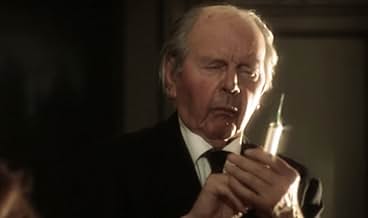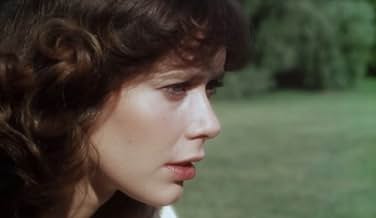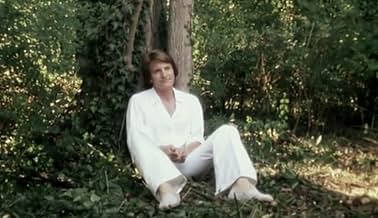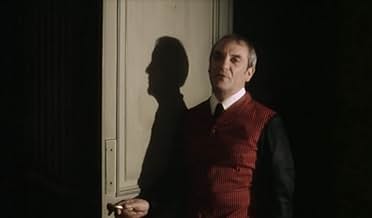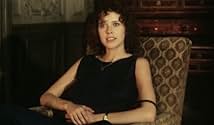Alice ou la dernière fugue
- 1977
- 1h 33min
NOTE IMDb
6,6/10
1,4 k
MA NOTE
Ajouter une intrigue dans votre langueAlice leaves husband, car breaks down, spends night at manor. Next day car fixed but owners missing, she's trapped in walled estate, increasingly worried by strange discoveries.Alice leaves husband, car breaks down, spends night at manor. Next day car fixed but owners missing, she's trapped in walled estate, increasingly worried by strange discoveries.Alice leaves husband, car breaks down, spends night at manor. Next day car fixed but owners missing, she's trapped in walled estate, increasingly worried by strange discoveries.
- Réalisation
- Scénario
- Casting principal
- Récompenses
- 1 nomination au total
Jean Le Boulbar
- Le Premier Homme
- (as Jean le Boulbar)
Avis à la une
I expected a film with a protagonist named "Alice Carroll" to have something to do with Lewis Carroll's Alice books, but Claude Chabrol's "Alice or the Last Escapade" (although it seems a mistranslation to me to go from "fugue" to "escapade") reminds me more of Luis Buñuel's "The Exterminating Angel" (1962) and seems to have more in common with a different book, which this film's Alice reads in one scene, Jorge Luis Borges's "Fictions." That would explain the quasi-surrealism, labyrinth and purgatory-like entrapment and genre elements closer to horror than to the fairy tales of Carroll. Besides the one character's name, I didn't see much here beyond a checkered floor pattern or a somewhat small door and a generally strange place and characters suggesting that the film took inspiration from the Alice books. It's not an especially egregious bait-and-switch in this regard, although it's a travesty to cite Alice for a film that also reads largely as a reactionary revenge fantasy on the era's politics of second-wave feminism.
Allow me to elaborate. The picture begins with the male gaze (the concept of the "male gaze," itself, being a product of feminist film theory of the same era as this film--within a couple years, in fact, as Laura Mulvey penned her essay "Visual Pleasure and Narrative Cinema" in 1975), as Alice's beau is watching TV. While doing so, he calls upon Alice to listen to him complain about his day. Fed up with this male-centric gaze and storytelling, she announces that she's leaving him. He assumes she's being hysterical (a more accurate reading of the "fugue" in the title, I suspect, with all the misogynistic connotations of diagnosing women "hysterical") and warns her against leaving that night. Undeterred, Alice drives off on her own escapade, but her being a female driver in a man's movie, she soon crashes the car. A film-within-the-film of her emotional reflections is even played out on the windshield before the glass is broken--suggesting the incident has more to do with the emotional storm inside her than with the rainy weather outside.
Alice takes shelter in a mansion in what turns out to be something of a twist on the haunted, old-dark-house formula. The strange men she meets here inform her that she's trapped there and that her state of affairs is a source of amusement for them. In other words, she's found herself the subject of the male gaze, of which she cannot escape. She's confined in a film, with the mansion its theatre. This is, perhaps, most striking in a sequence that would otherwise seem to be a display of gratuitous nudity, as Alice stands seemingly alone in her room with a disembodied voice speaking to her. She tries to cover herself from an unseen gaze. Who's subjugating her with this voyeurism? We, the spectator, are.
This is such a well-constructed bit of reflexive composition centered on the cinematographic apparatus--its gaze and, thus, our gaze. It makes for a more engaging picture than the questionable ideology and trite sexism displayed would otherwise deserve.
Allow me to elaborate. The picture begins with the male gaze (the concept of the "male gaze," itself, being a product of feminist film theory of the same era as this film--within a couple years, in fact, as Laura Mulvey penned her essay "Visual Pleasure and Narrative Cinema" in 1975), as Alice's beau is watching TV. While doing so, he calls upon Alice to listen to him complain about his day. Fed up with this male-centric gaze and storytelling, she announces that she's leaving him. He assumes she's being hysterical (a more accurate reading of the "fugue" in the title, I suspect, with all the misogynistic connotations of diagnosing women "hysterical") and warns her against leaving that night. Undeterred, Alice drives off on her own escapade, but her being a female driver in a man's movie, she soon crashes the car. A film-within-the-film of her emotional reflections is even played out on the windshield before the glass is broken--suggesting the incident has more to do with the emotional storm inside her than with the rainy weather outside.
Alice takes shelter in a mansion in what turns out to be something of a twist on the haunted, old-dark-house formula. The strange men she meets here inform her that she's trapped there and that her state of affairs is a source of amusement for them. In other words, she's found herself the subject of the male gaze, of which she cannot escape. She's confined in a film, with the mansion its theatre. This is, perhaps, most striking in a sequence that would otherwise seem to be a display of gratuitous nudity, as Alice stands seemingly alone in her room with a disembodied voice speaking to her. She tries to cover herself from an unseen gaze. Who's subjugating her with this voyeurism? We, the spectator, are.
This is such a well-constructed bit of reflexive composition centered on the cinematographic apparatus--its gaze and, thus, our gaze. It makes for a more engaging picture than the questionable ideology and trite sexism displayed would otherwise deserve.
3plex
I'm not sure I have watched the same movies as the others, who give this film glowing reviews, pretty much across the board.
Most of us are aware of Sylvia Kristel's work: she's one of the few Euro-actors who have found relative success in the Hollywood mainstream. But to be fair, most of he notoriety and success comes from the soft-core Emmanuelle franchise which are staged in various parts of the world. Kristel is easy-on-the-eyes for most, looks fine in full frontal nudity, which to be honest, (and with no negating criticism) is largely what she is known for. And on that same level of honesty is a better actress than most who come from other countries ( in this case, the Netherlands) aside from England.
To say this film plods along at a snail's pace is an insult to snails. This isn't Kubrick/Kurosawa-esque deliberate slow-pacing, its simply SLOOOWW. There's vey little dialogue, especially from our lead protagonists, and on that note, there's very little story-line or plot.
Kristel does a lot walking around in the "spooky manor" she finds herself "pseudo" imprisoned, sometime it allows her to venture outside where she does some more walking around, and after about an hour into the film she somehow escapes the manor to drive around for a while. There's a lot of dramatic musical underscoring to make-up for a lack of basic drama in the film. Of course, Sylvia does appear full frontal one time in the film, with style hair and make-up. The rest of the time she magically has all of these nice stylish outfits to wear, but I'm still not clear to why she was wearing them and for whom. I still have not figured out the point of this sleepy film that nearly put me in a coma.....
Most of us are aware of Sylvia Kristel's work: she's one of the few Euro-actors who have found relative success in the Hollywood mainstream. But to be fair, most of he notoriety and success comes from the soft-core Emmanuelle franchise which are staged in various parts of the world. Kristel is easy-on-the-eyes for most, looks fine in full frontal nudity, which to be honest, (and with no negating criticism) is largely what she is known for. And on that same level of honesty is a better actress than most who come from other countries ( in this case, the Netherlands) aside from England.
To say this film plods along at a snail's pace is an insult to snails. This isn't Kubrick/Kurosawa-esque deliberate slow-pacing, its simply SLOOOWW. There's vey little dialogue, especially from our lead protagonists, and on that note, there's very little story-line or plot.
Kristel does a lot walking around in the "spooky manor" she finds herself "pseudo" imprisoned, sometime it allows her to venture outside where she does some more walking around, and after about an hour into the film she somehow escapes the manor to drive around for a while. There's a lot of dramatic musical underscoring to make-up for a lack of basic drama in the film. Of course, Sylvia does appear full frontal one time in the film, with style hair and make-up. The rest of the time she magically has all of these nice stylish outfits to wear, but I'm still not clear to why she was wearing them and for whom. I still have not figured out the point of this sleepy film that nearly put me in a coma.....
Alice Carol (Sylvia Kristel) leaves her husband (Bernard Rousselet) in a rainy night telling that she does not like him anymore. She travels alone but when her car breaks the windshield in a lonely road, she crosses the gate of a creepy manor and is welcomed by the owner Henri Vergennes (Charles Vanel) and his butler Colas (Jean Carmet) that invite Alice to spend the night in the house. On the next morning, Alice does not meet the two men and finds the windshield of her car surprisingly fixed. She tries to leave the real estate but does not find the gate. She stops the car and walks around the wall trying to find an exit. Soon she finds that she is trapped and cannot leave the property.
"Alice ou la Dernière Fugue" is an intriguing unknown masterpiece written and directed by Claude Charbrol and supported basically by the wonderful performance of the gorgeous Sylvia Kristel. The story is developed in a nightmarish atmosphere and the name of the lead character "Alice Carol" seems to be a tribute to "Alice in the Wonderland" of Lewis Carroll. Further, Adrian Lyne's "Jacob's Ladder" is visibly inspired in the storyline of this film. The mystery is kept until the very last scene. My vote is nine.
Title (Brazil): "Alice"
Note: On 17 November 2024, I saw this film again.
"Alice ou la Dernière Fugue" is an intriguing unknown masterpiece written and directed by Claude Charbrol and supported basically by the wonderful performance of the gorgeous Sylvia Kristel. The story is developed in a nightmarish atmosphere and the name of the lead character "Alice Carol" seems to be a tribute to "Alice in the Wonderland" of Lewis Carroll. Further, Adrian Lyne's "Jacob's Ladder" is visibly inspired in the storyline of this film. The mystery is kept until the very last scene. My vote is nine.
Title (Brazil): "Alice"
Note: On 17 November 2024, I saw this film again.
Surprising movie! A twist in the end! I like such movies, when the viewer is fooled ...when what we thought we understood is overturned! Reminds me of something from 'The Sixth Sense'. Do you agree? I didn't like the the acting of Silvia Kristel in a few sequences, as she seemed to be making some effort to speak. In the first shots with her husband, she acted strangely as she didn't seem distressed at all when announcing the latter that she would leave him. There was no visible stress on her face and she appeared relaxed when communicating her departure. The husband also acted strangely when he told her to stay one more night and to leave tomorrow morning! No one would have realistically said that! didn't like a few shots as well...For instance, some night shots in the beginning were not properly lit. But, it remains a movie with a great script, with minimal dialog, with each shot compelling us to ask...'what will happen next?'. The characters were all weird - and later we can deduce why...
I saw this movie on TV when I was 11 years old and it had a deep impression on me. Watching it again, I can identify many elements which are (and already were in the 1976) very conventional, or even outdated: the existentialist/ nouveau roman-plot, the Margritte-aesthetics, the "Psycho"-allusions...
The portrait of Alice (Kristel, sensuous as ever) and of her fate is sometimes of a certain merciless quality (misogynous tendencies?), but this movie is emulating the scenario of a real "cauchemare" far better than any other "Splatter" or "Horror"-Movie.
The portrait of Alice (Kristel, sensuous as ever) and of her fate is sometimes of a certain merciless quality (misogynous tendencies?), but this movie is emulating the scenario of a real "cauchemare" far better than any other "Splatter" or "Horror"-Movie.
Le saviez-vous
- AnecdotesSylvia Kristel said in a 1981 interview that she feels this movie bombed because she only had one nude scene. She said "For some reason the roles in which I keep my clothes on never become successful movies."
- ConnexionsFeatures Des chiffres et des lettres (1972)
- Bandes originalesLe 24ème concerto en ut mineur
by Wolfgang Amadeus Mozart (as Mozart)
Performed on piano by Paul Von Schilhawski
Conducted by Rudolf Albert
Disque MUSIDISC.
Meilleurs choix
Connectez-vous pour évaluer et suivre la liste de favoris afin de recevoir des recommandations personnalisées
- How long is Alice or The Last Escapade?Alimenté par Alexa
Détails
- Date de sortie
- Pays d’origine
- Langue
- Aussi connu sous le nom de
- Alice or The Last Escapade
- Lieux de tournage
- Chateau des Migneaux, Villennes sur Seine, France(Mansion of Henri Vergennes)
- Sociétés de production
- Voir plus de crédits d'entreprise sur IMDbPro
- Durée
- 1h 33min(93 min)
- Mixage
- Rapport de forme
- 1.66 : 1
Contribuer à cette page
Suggérer une modification ou ajouter du contenu manquant

